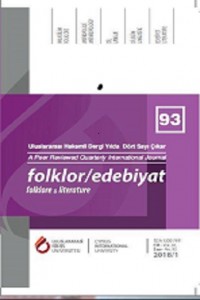Öz
The Guyanese poet Grace Nichols’s ekphrastic poem “Weeping Woman” in her Picasso, I
Want My Face Back challenges Pablo Picasso’s iconic status in twentieth-century art. Written in
the form of a dramatic monologue, the poem gives voice to Picasso’s model, muse and lover, Dora
Maar, who was a Surrealist photographer before she had an affair with Picasso. Unlike traditional
ekphrastic poems which involve the description of a fixed, silenced and gazed beautiful image
through a male persona who is also a gazer of that image in poetry, Nichols transforms Maar’s
objectified position in Picasso’s painting into a subject by voicing her critique of the artist’s cubist
art, his use of colors as well as his geometric figures, and of his maltreatment of her. Through
this ekphrastic stance, Maar reconstructs her identity as a photographer and rids herself from
the artist’s domination over her in his art and personal life. Hence, the aim of this article is to
discuss in what ways Nichols’s poem problematizes the privileged status of the male artist over
his silenced female model and acknowledges the artistic talent of the woman through the use of
ekphrasis.
Anahtar Kelimeler
Kaynakça
- Caws, M. A. (09. 04. 2015). A tortured goddess. The Guardian.
- Da Vinci, L. (2001). Leonardo on painting. M. Kemp (Ed.) (M. Kemp and M. Walker, Trans.) New Haven: Yale Nota Bene. .
- Goldhill, S. (January 2007). What is ekphrasis for?. Classical Philology, Volume 102 (Issue 1), pp. 1-19.
- Griffin, G. (1993). Writing the body: reading Joan Ridley, Grace Nichols and Ntozake S h a n g s . Black women’s writing. G. Wisker (Ed.) (pp. 19-42). Hampshire and London: Macmillan.
- L’Enfant, J. (1996-1997). Dora Maar and the art of mystery. Woman’s Art Journal, Volume 17 (Issue 2), pp. 15-20.
- Lessing, G. E. (1984). Laocoön. (E. A. McCormick, Trans.) Baltimore, Maryland: The Johns Hopkins University Press.
- Lord, J. (1993). Picasso and Dora: A personal memoir. New York: Farrar Straus Giroux.
- Mitchell, W. J. T. (1986). Iconology: image, text, ideology. Chicago: The University of C h i c a g o Press.
- Mitchell, W. J. T. (1994). Picture theory. Chicago: The University of Chicago Press.
- Nichols, G. (1983). Epilogue. I is a long memoried woman (p. 87). London: Karnak House.
- Nichols, G. (2004). Paint me a poem: New poems inspired by painting and sculptures in Tate. London: A & C Black.
- Nichols, G. (2009). Weeping woman. Picasso, I want my face back (pp. 9-20). N o r t h u m b e r l a n d : Bloodaxe Books.
- Wisker, G. (1993). Introduction. G. Wisker (Ed.). Black women’s writing (pp.1-18). Hampshire and London: Macmillan.
Ayrıntılar
| Birincil Dil | İngilizce |
|---|---|
| Konular | Sanat ve Edebiyat |
| Bölüm | Derleme Makaleleri -Compilation Articles |
| Yazarlar | |
| Yayımlanma Tarihi | 1 Şubat 2018 |
| Yayımlandığı Sayı | Yıl 2018 Cilt: 24 Sayı: 93 |
Derginin yayım dili Türkçe ve İngilizce’dir, ayrıca Türkçe de olsa tüm basılan makalelerin başlık, öz ve anahtar sözcükleri İngilizce olarak da makalede bulunur. Hakemlerden onay almış Türkçe makaleler için 750-1000 sözcükten oluşan genişletilmiş özet (extended summary) gereklidir. Elektronik çeviriler kabul edilmez.
Dergi TR-Dizin, Web of Science (ESCI), DOAJ ile diğer pek çok dizin tarafından taranmaktadır. Scimagoe quartile değeri: Q2 'dir:
TR DIZIN 2020 Etik Kriterleri kapsamında, dergimize 2020 yılından itibaren etik kurul izni gerektiren çalışmalar için makalenin yöntem bölümünde ilgili Etik Kurul Onayı ile ilgili bilgilere (kurul-tarih-sayı) yer verilmesi gerekecektir. Bu nedenle dergimize makale gönderecek olan yazarlarımızın ilgili kriteri göz önünde bulundurarak makalelerini düzenlemeleri önemle rica olunur.
Alan Editörleri/ Field Editörs
Halkbilimi/Folklore
Prof.Dr. Hande Birkalan-Gedik (JohannWolfgang-Goethe İniversitet-birkalan-gedik@m.uni-frankfurt.de)
Prof.Dr. Ali Yakıcı (Gazi Üniversitesi-yakici@gazi.edu.tr)
Prof.Dr. Aynur Koçak (Yıldız Teknik Üniversitesi-nurkocak@yildiz.edu.tr)
Prof.Dr. Işıl Altun (Regensburg Üniversitesi/Kocaeli Üniversitesi-İsil.Altun@zsk.uni-regensburg.de)
Doç.Dr. Ahmet Keskin (Samsun Üniversitesi-ahmet.keskin@samsun.edu.tr)
Edebiyat/Literature
Prof.Dr. Abdullah Uçman (Mimar Sinan Güzel Sanatlar Üniversitesi -emekli-29 MayısÜniversitesi-abdullahucman@29mayis.edu.tr
Prof. Dr. Ramazan Korkmaz (Ardahan Üniversitesi-emekli-Kafkasya Üniversiteler Birliği -KÜNİB-r_korkmaz@hotmail.com)
Prof.Dr. Emel Kefeli (Marmara Üniversitesi-emekli-İstanbul 29 Mayıs Üniversitesi-ayseemelkefeli @gmail.com)
Prof.Dr. Zekiye Antakyalıoğlu ( İstanbul Aydın Üniversitesi-zekabe@hotmail.com)
Antropoloji/Anthropology
Prof.Dr. Hanife Aliefendioğlu (Doğu Akdeniz Üniversitesi-hanife.aliefendioglu@emu.edu.tr)
Prof. Dr. Şebnem Pala Güzel (Başkent Üniversitesi-sebnempa@baskent.edu.tr)
Prof.Dr. Derya Atamtürk Duyar (İstanbul Üniversitesi-datamturk@istanbul.edu.tr)
Prof.Dr. Meryem Bulut (Ankara Üniversitesi-meryem.bulut@gmail.com)
Dil-Dilbilim/Language-Linguistics
Prof.Dr. Nurettin Demir (Hacettepe Üniversitesi-demir@hacettepe.edu.tr)
Prof. Dr. Aysu Erden (Maltepe Üniversitesi-aysuerden777@gmail.com)
Prof.Dr. Sema Aslan Demir (Hacettepe Üniversitesi-semaaslan@hacettepe.edu.tr)


